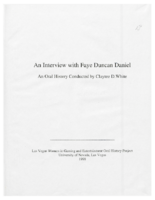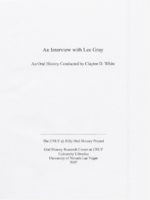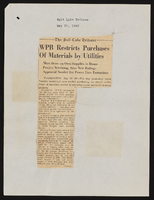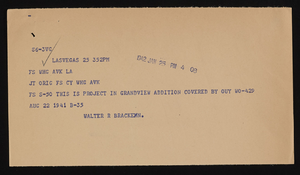Search the Special Collections and Archives Portal
Search Results

Transcript of interview with Anna Bailey by Claytee D. White, March 3, 1997
Date
Archival Collection
Description
Interview with Anna Bailey conducted by Claytee D. White on March 3, 1997. Arriving in Las Vegas in 1955 to perform as a dancer for the opening of the Moulin Rouge, Bailey also starred in traveling shows nationally and in Europe. Returning to Las Vegas, she became the first African American to dance in a house chorus line on the Strip. Later she became one of the first black women in Nevada to hold a gaming license, owning and operating several small nightclubs.
Text

Transcript of interview with Faye Duncan Daniel by Claytee D. White, October 18, 1996
Date
Archival Collection
Description
Interview with Faye Duncan Daniel conducted by Claytee D. White on October 18, 1996. Beginning in clerical work at the Nevada Test Site, Daniel rose to become the Assistant Hotel Manager at Union Plaza Hotel and Casino. She established the Hotel Managers Association and the Professional Black Women's Alliance. After leaving the gaming industry, Daniel returned to school to train for a career in education. She worked closely with the Displaced Homemaker Program at the Community College of Southern Nevada and later with Help Centers of Southern Nevada.
Text

Transcript from interview with Helen Anderson and Karen Walker by Claytee White and Barbara Tabach, February 21, 2014
Date
Archival Collection
Description
Helen Anderson came to Las Vegas in 1962 from Arkansas, and had her daughter, Karen, in 1967. The pair discusses the family business, Hamburger Heaven, and other businesses on Jackson Street and the Westside. They also talk about hte changes in the neighborhood and their work with the West Las Vegas Citizens for Hope group, and Karen's family services business.
Text

Transcript of interview with Velma Haselton by Catherine Bellver, September 13, 2001
Date
Archival Collection
Description
Interviewed by Catherine Bellver. Velma Haselton was born in St. Louis, Missouri, in 1914. She worked as an assistant bookkeeper for Hart, Schaffner and Marx and rose to Assistant Credit Manager. Velma worked at various jobs after she married for the second time and her son was born. She also represented the San Francisco CPA firm Lybrand, Ross Brothers and Montgomery (now Coopers Lybrand) in various capacities, both in California and St. Louis, eventually attaining the position of controller. Velma moved to Las Vegas for the first time in the 1950s, where she and her husband Don ran a coffee shop at the Park Lane Motel on South Fifth Street. Family requirements necessitated a move back to California. In 1971, Velma and her third husband, Charles Haselton, "retired" to Las Vegas. Velma immediately went to work as a cost accountant for United Pipeline, and later as an accountant for Kafoury Armstrong, a CPA firm. She eventually ran her own accounting business. Velma also held memberships and offices in various women's service groups.
Text

Jean Sherman McColl interview, March 1, 1977: transcript
Date
Description
On March 1, 1977, collector Sam C. Melchiome Jr. interviewed Jean McColl (born May 24th, 1931 in California) at her home in Las Vegas, Nevada. In this interview, Jean McColl discusses growing up in Searchlight and then Las Vegas, Nevada. She discusses how her family came here as well as the many changes she has seen through the decades living in Las Vegas, Nevada.
Text

Jack K. Leavitt interview, February 28, 1979: transcript
Date
Archival Collection
Description
On February 28, 1979, collector Alick Dziabczenko interviewed Jack Leavitt in Las Vegas, Nevada. In this interview Mr. Leavitt talks about his childhood in Las Vegas. He also talks about his family life and his career in the city, as well as some of the many changes he has seen in Las Vegas.
Text

Transcript of interview with Lee Gray by Claytee D. White, November 20, 2006
Date
Archival Collection
Description
Interview with Lee Gray conducted by Claytee D. White on November 20, 2006. Gray came to Las Vegas as a child in the 1950s and attended school at Westside Elementary, K. O. Knudsen Jr. High, and Rancho High School. Following high school, Gray worked for Bob Williams during the summer, helping with Bob's comedy act. After two years of college at Central Arizona College in Glendale, Gray transferred to Regis College in Denver, Colorado, where he worked as a teacher's aide for a school district before returning to Las Vegas to work at University of Nevada, Las Vegas. Beginning in grounds keeping, Gray rose to become supervisor of UNLV's HV/AC Department.
Text

Transcript of interview with Ida Bowser by Claytee D. White, August 30, 2007
Date
Archival Collection
Description
Interview with Ida Bowser conducted by Claytee D. White on August 30, 2007. Born in Tallulah, Louisiana, Bowser came to Las Vegas as a child. Her first job after high school was as a teacher's aide. Later, she worked as a maid at the Sahara and Flamingo hotels. Disenchanted with maid's work, Bowser applied to the welfare office for on-the-job training and began working for the UNLV library, where she remained for thirty-seven years. Bowser recalls Ruby Duncan and the civil rights movement, notable individuals and places, and a discrimination lawsuit.
Text


